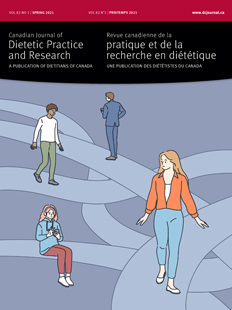Abstract
Purpose: To pilot test the Food Skills Questionnaire (FSQ) to evaluate a cooking intervention.
Methods: Students attending Western University were invited to participate in 3 cooking classes over a 3-month period. All participants were asked to complete the FSQ pre- and post-intervention. The FSQ evaluated food skills in 3 domains—Food Selection and Planning, Food Preparation, and Food Safety and Storage—with a maximum score of 100 per domain. Domain scores were then computed as a weighted average for the Total Food Skills Score out of 100. Open-ended questions assessed participants’ perceptions of the classes.
Results: Forty-four students participated. There was a significant increase in food planning (70.6 ± 13.5–77.6 ± 14.3, P < 0.01), food preparation (67.5 ± 14.0–74.9 ± 12.9, P < 0.01), food safety (78.0 ± 9.9–80.8 ± 13.0, P = 0.04), and total food skills (71.9 ± 8.9–77.8 ± 10.6, P < 0.01) post-intervention. Content analysis of open-ended questions indicated that participants enjoyed healthy recipes, supportive Peer Educators, discussions, the cooking experience, socializing, and the safe environment.
Conclusions: The FSQ shows strong potential for evaluating basic (e.g., peeling, chopping, slicing) to intermediate (e.g., meal planning) food skills in an effective and feasible manner. It can also capture changes in specific domains, allowing the development of more focused nutrition education and skills-based interventions.
Résumé
Objectif. Réaliser un essai pilote du Questionnaire sur les compétences alimentaires (QCA) pour évaluer une intervention culinaire.
Méthodes. Des étudiants de l’Université Western ont été invités à participer à 3 cours de cuisine sur une période de 3 mois. On a demandé à tous les participants de remplir le QCA avant et après l’intervention. Le QCA a permis d’évaluer les compétences alimentaires dans 3 domaines – sélection et planification des aliments, préparation des aliments, et entreposage et salubrité des aliments – avec un score maximum de 100 par domaine. Les scores des domaines ont ensuite été calculés sous la forme d’une moyenne pondérée en vue d’obtenir un score sur 100 pour les compétences alimentaires globales. Des questions ouvertes ont permis d’évaluer la perception des participants quant aux cours.
Résultats. Quarante-quatre étudiants ont participé. On a constaté une augmentation significative sur les plans de la planification des aliments (70,6 ± 13,5 à 77,6 ± 14,3, P < 0,01), de la préparation des aliments (67,5 ± 14,0 à 74,9 ± 12,9, P < 0,01), de la salubrité des aliments (78,0 ± 9,9 à 80,8 ± 13,0, P = 0,04) et des compétences alimentaires globales (71,9 ± 8,9 à 77,8 ± 10,6, P < 0,01) après l’intervention. L’analyse du contenu des questions ouvertes a indiqué que les participants ont apprécié les recettes santé, le soutien des pairs éducateurs, les discussions, l’expérience culinaire, la socialisation et l’environnement sécuritaire.
Conclusions. Le QCA présente un fort potentiel pour évaluer les compétences alimentaires de base (p. ex. peler, hacher, trancher) à intermédiaires (p. ex. planifier des repas) d’une manière efficace et réalisable. Il permet également de cerner les changements dans des domaines en particulier, permettant ainsi de développer des interventions d’éducation à la nutrition et de développement des compétences plus ciblées.



